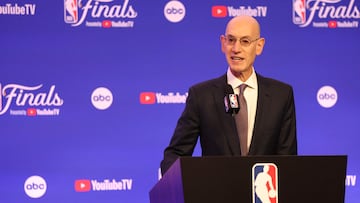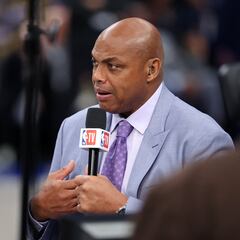Adam Silver reveals plans to expand the NBA’s influence in Europe
Adam Silver confirmed in Paris that the NBA is studying ways to expand its influence in Europe; in a business sense, but also in a sporting sense.

Adam Silver’s NBA continues to take steps to turn its healthy state of being into an even brighter future. First, the new collective bargaining agreement was signed, guaranteeing social peace between franchises and players. Then came the new television contracts. The certainty that the NBA will continue to boost its already historic economic numbers: contracts have been signed for 11 years and 76 billion dollars.
NBA to expand from 30 to 32 teams
The next step will surely be, in the medium term, expansion, the arrival of two more franchises to boost the league from 30 to 32 teams with Las Vegas and Seattle as overwhelming favorites. But there is another issue, one that is not central but important, or so it seems at this point, for the NBA: expansion, at least in terms of business, in Europe.
Tyler Herro pump fake.
— NBA (@NBA) August 13, 2024
Tyler Herro pump fake.
Caleb Martin slashing slam.
This play from April is what #NBAAssistWeek is all about! pic.twitter.com/zewRqnR9Mc
How basketball’s infrastructure in Europe can be improved
The commissioner spoke a few days ago, in conversation with Associated Press within the framework of the Olympic basketball tournament. Silver made it clear that they have been studying the structure of the game and its competitions on the old continent for some time: “We want to make sure that we have enough understanding of this opportunity. We don’t want to damage the backbone of the infrastructure that is in place. On the other hand, in terms of regional competitions in Europe, it makes me think that many of the investors lose significant amounts of money every year. And although this is not just about money, things that make you lose money without any real sense ultimately do not survive.”
He continued, “We haven’t made any decisions. I still think we have a huge opportunity. It’s not that we want to transform an entire league in a short period of time, but I think there is a desire from our owners to invest more in basketball globally. Given the quality of basketball here in Europe, it would make sense for us to try to do something with it”.
👀🏀 ¡#Madridistas, echad un ojo a nuestras mejores jugadas en la @ACBCOM esta temporada! pic.twitter.com/V8T4rHVX8N
— Real Madrid Basket (@RMBaloncesto) July 22, 2024
Possibility of a new basketball competition in Europe
In February, the portal Sportico announced that the NBA has been working with an investment fund, The Raine Group, to analyze its interests and possibilities in Europe, including the creation of its own competition like the one it has launched in Africa (BAL, Basketball African League).
The NBA has always been an instigator, at the very least in a sentinel or observer role, in the conflicts between FIBA and the Euroleague, which are also slowly moving towards a thaw. The Euroleague acknowledged that it has held talks with the American league, but the latter assured AS that it has not seen a feasible joint plan for months and that it has put aside any conversation with the Euroleague in order to cooperate with FIBA, with which it has a very fluid relationship. Mark Tatum, vice commissioner and right-hand man of Silver, is in fact a member of the FIBA board.
Jan Vesely 𝐁𝐄𝐒𝐓 𝐏𝐋𝐀𝐘𝐒 𝐈𝐍 𝐓𝐇𝐄 𝟐𝟎𝟐𝟑-𝟐𝟒 𝐒𝐄𝐀𝐒𝐎𝐍 with @FCBbasket 🔴🔵#EveryGameMatters pic.twitter.com/08go7YOCA0
— Turkish Airlines EuroLeague (@EuroLeague) August 12, 2024
Mike Vorkunov, a journalist for The Athletic who is well connected to NBA offices, also points to moves to expand the NBA’s influence in Europe. But he warns, of course, that this is a basketball culture with a strong tradition, a history of well-established big clubs and a very specific and established competitive ecosystem.
In that sense, the NBA could look for gaps between clubs with a permanent license (among them Real Madrid, Barcelona and Baskonia) but these, in principle, extended their commitment to the Euroleague until 2040.
Related stories
“The fear has always been that if the NBA gets in, it will be like the United States: business, entertainment and then sport,” European sources told Vorkunov. The thing is, and Silver has confirmed, there is something going on.
The NBA is moving, slowly but steadily, and Europe is already facing something that may be part of the solution but also part of the problem: the NBA has its own idiosyncrasies, interests and way of understanding business, but also a capacity to exploit its brand and generate income that is not even close to that of European basketball, where the commercial aspect continues to be an obvious headache.


Complete your personal details to comment